
CPD Ref: C-101730
CPD Points: ![]()
CPD Type: Non-interactive
Closing Date: 31 December 2025
Domains: Clinical practice, Professionalism
![]()
![]()
The fifth part of the glaucoma series explores the assessment and measurement of the optic disc, highlighting key signs of glaucoma. It explains how to use indirect ophthalmoscopy and interpret OCT disc images to support referral decisions and the management of glaucoma suspects.
Topics: Glaucoma, NICE, SIGN, POAG, COAG, Optic disc, Assessment, Slit lamp, Indirect ophthalmoscopy, OCT, Management, Referral, Volk.
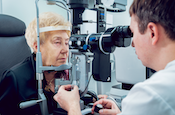
CPD Ref: C-101748
CPD Points:![]()
CPD Type: Non-interactive
Closing Date: 31 December 2025
Domains: Clinical practice, Professionalism
![]()
![]()
The sixth part of the glaucoma series focuses on accurately evaluating the visual field to identify important signs of glaucoma.
Topics: Glaucoma, NICE, SIGN, Management, Referral, Threshold, SITA, ZATA, Static, Kinetic, FDT.

CPD Ref: C-101749
CPD Points:![]()
CPD Type: Non-interactive
Closing Date: 31 December 2025
Domains: Clinical practice, Professionalism
![]()
![]()
The seventh part of the glaucoma series explores national and local refinement and referral pathways, and discusses how to make appropriate clinical decisions in managing a glaucoma suspect by considering all investigative findings.
Topics: Glaucoma, NICE, SIGN, POAG, COAG, Ocular hypertension, Management, Referral, Repeat measures, Pathway, IOP, Visual field.

CPD Ref: C-101750
CPD Points: ![]()
CPD Type: Non-interactive
Closing Date: 31 December 2025
Domains: Clinical practice, Specialty CPD (IP)
![]()
![]()
The eighth and final part of the glaucoma series explores current and future treatments of glaucoma.
Topics: Glaucoma, NICE, SIGN, POAG, COAG, CAG, Ocular hypertension, Laser treatment, Surgical treatment, Pharmacological treatments, Management, Referral, MIGS, SLT.
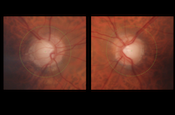
CPD Ref: C-106052
CPD Points: ![]()
CPD Type: Non-interactive
Closing Date: 31 December 2025
Domains: Clinical practice
![]()
In this recorded lecture, led by Mr Paddy Gunn, optometrists are given an opportunity to assess and reflect on their optic disc interpretation skills for a range of patient cases. The cases review the key elements to look out for when examining the optic disc, other information to consider and how to use technology, such as OCT, to effectively support the management of glaucoma suspects.
Topics: Visual fields, Tonometry, Glaucoma, OCT, IOP, Normal tension, Ocular hypertension, Optic pit, Optic nerve, RNFL.
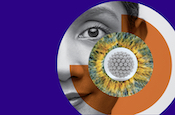
CPD Ref: C-108048
CPD Points: ![]()
CPD Type: Non-interactive
Closing Date: 31 December 2025
Domains: Clinical practice, Specialty CPD (IP)
![]()
![]()
This is the first part of Docet’s new programme on immunology. Part one covers the basics of the immune system, building a foundation to enable optometrists to understand systemic and ocular immunity and what happens when things go wrong. This course will build current understanding for all optometrists and be useful as a core programme for IP optometrists or those planning to start their IP qualifications.
Topics: Allergy, Immunology, Atopy, Pharmacological, Hypersensitivity, Innate, Autoimmune, Adaptive, Leucocytes, Infection, Immunology series.
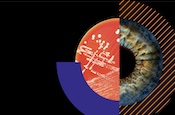
CPD Ref: C-108280
CPD Points: ![]()
CPD Type: Non-interactive
Closing Date: 31 December 2025
Domains: Clinical practice, Specialty CPD (IP)
![]()
![]()
This is the second part of Docet’s new programme on immunology and the eye. Part two continues to set the foundation for optometrists in immunology and covers the basics of ocular immunology, allergy, and autoimmune disease. This course will build current understanding for all optometrists and be useful as a core programme for IP optometrists or those planning to start their IP qualifications.
Topics: Allergy, Immunology, Atopy, Pharmacological, Hypersensitivity, Autoimmune, Infection, Cornea, Tears, Conjunctiva, Antibodies, Immunology series.
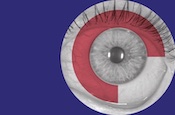
CPD Ref: C-108643
CPD Points: ![]()
CPD Type: Non-interactive
Closing Date: 31 December 2025
Domains: Clinical practice, Communication, Specialty CPD (IP)
![]()
![]()
![]()
This is the third part of our new course on immunology for optometrists. Part three examines seasonal allergic conjunctivitis (SAC) and perennial allergic conjunctivitis (PAC). It covers the signs, symptoms, and differential diagnosis and offers expert opinions from optometrists and pharmacists on how to investigate and manage the conditions for both non-IP and IP optometrists in community practice.
Topics: Hay fever, Rhinitis, Allergy, Anti-histamines, Immunology, Pharmacy, Allergens, Contact lenses, Mast cell stabilisers, Drugs, Atopy, Pharmacological, Referral, Seasonal, Perennial, Hypersensitivity, Red eye, Immunology series.

CPD Ref: C-108946
CPD Points: ![]()
CPD Type: Non-interactive
Closing Date: 31 December 2025
Domains: Clinical practice, Communication, Specialty CPD (IP)
![]()
![]()
![]()
This is the fourth part of our new course on immunology for optometrists. Part four looks at acute allergic conjunctivitis (AAC), atopic keratoconjunctivitis (AKC) and vernal keratoconjunctivitis (VKC). It covers the signs, symptoms and differential diagnosis and offers expert opinions from optometrists and pharmacists on how to investigate and manage the conditions, for both non-IP and IP optometrists in community practice.
Topics: Allergy, Anti-histamines, Immunology, Pharmacy, Allergens, Mast cell stabilisers, Drugs, Atopy, Pharmacological, Referral, Hypersensitivity, Red eye, Cornea, Spring catarrh, Immunology series.
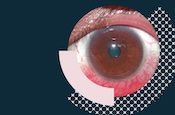
CPD Ref: C-109068
CPD Points: ![]()
CPD Type: ![]()
Closing Date: 1 December 2025
Domains: Clinical practice, Communication, Specialty CPD (IP)
![]()
![]()
![]()
This is the fifth and final part of our new course on immunology for optometrists. Part five looks at contact lens-associated papillary conjunctivitis (CLAPC) and conjunctivitis medicamentosa (CM). It covers the signs, symptoms and differential diagnosis and offers expert opinions from optometrists and pharmacists on how to investigate and manage the conditions, for both non-IP and IP optometrists in community practice.
Topics: Allergy, Anti-histamines, Immunology, Pharmacy, Allergens, Mast cell stabilisers, Drugs, Atopy, Pharmacological, Referral, Hypersensitivity, Red eye, Cornea, Contact lenses, Glaucoma, Preservatives, GPC, Immunology series.

CPD Ref: C-108782
CPD Points: ![]()
CPD Type: Non-interactive
Closing Date: 31 December 2025
Domains: Leadership & Accountability
![]()
In this recorded lecture, Richard Edwards, clinical consultant to the Optical Consumer Complaints Service (OCCS), reminds delegates of the leadership role they need to take in practice in order to be more accountable for safe clinical care. Based around three case studies, this session aims to equip optometrists with a greater understanding of the evolving regulatory landscape, enabling them to manage patient concerns and complaints effectively.
Topics: Record keeping, GDPR, Consent, Professionalism.
 CPD Ref: C-110971
CPD Ref: C-110971
CPD Points:![]()
CPD Type: Non-interactive
Closing Date: 31 August 2025
Domains: Leadership & Accountability, Professionalism
![]()
![]()
Accredited Level 2 e-learning, covering the key safeguarding issues that optometrists need to be aware of when working with adults at risk.
Topics: Safeguarding, Legal, At risk, Social services, Abuse, Neglect, Record keeping, Physical, Psychological, Disability, Dementia, Sexual, Slavery, Radicalisation.

CPD Ref: C-110972
CPD Points:![]()
CPD Type: Non-interactive
Closing Date: 31 August 2025
Domains: Leadership & Accountability, Professionalism
Accredited Level 2 e-learning, introducing optometrists to the key issues surrounding child abuse. The course explains how to recognise and deal with issues that might arise in optometric practice when working with children.
Topics: Safeguarding, Legal, At risk, Social services, Abuse, Neglect, Record keeping, Physical, Psychological, Disability, Newly qualified, Sexual, Radicalisation.
![]() CPD Ref: C-110948
CPD Ref: C-110948
CPD Points: ![]()
CPD Type: Non-interactive
Closing Date: 30 September 2025
Domains: Communication, Clinical Practice
![]()
![]()
This podcast episode builds on the Docet webinar Dementia and Optometry: Research and Practice. Michelle speaks with Rakhee Shah and Simon Raw to address attendee questions and reinforce the key messages about the vital connection between vision and dementia. We also hear from Fadi Alfaqawi about how to assess the best course of action for a patient when advanced visual corrections are needed.
Topics: Dementia, Alzheimer’s disease, Cataract, Vision loss, Visual impairment, Vision assessment, Domiciliary eyecare, Communication, Consent, Referrals.
![]() CPD Ref: C-111350
CPD Ref: C-111350
CPD Points: ![]()
CPD Type: Non-interactive
Closing Date: 30 September 2025
Domains: Professionalism, Leadership & Accountability
![]()
![]()
In this episode, Michelle welcomes Neil Retallic, an optometrist and mental welfare researcher who explains why stress and burnout are so prevalent in our profession. We also hear from Dr Nicholas Taylor, consultant psychiatrist, about early interventions to prevent long-term mental health issues.
Topics: Stress, Anxiety, Burnout, Wellbeing, Mental health, Compassion fatigue, Cognitive behavioural therapy.
![]() CPD Ref: C-111661
CPD Ref: C-111661
CPD Points: ![]()
CPD Type: Non-interactive
Closing Date: 31 December 2025
Domains: Professionalism, Leadership & Accountability
![]()
![]()
This episode explores the systemic and neurological effects of chronic stress, highlighting its long-term impact on health. Experts discuss the body’s response to stress, its influence on brain function and behaviour, and strategies to protect mental well-being in healthcare professionals.
Topics: Stress, Anxiety, Wellbeing, Mental health, Brain health, Cortisol, Hormones, Depression, Inflammation, Dementia.
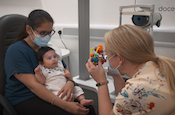
CPD Ref: C-104215
CPD Points: ![]()
CPD Type: Non-interactive
Closing Date: 30 September 2025
Domains: Clinical practice, Communication
![]()
![]()
This is the first instalment of a three-part course focused on assessing vision from birth to 18 years. Part one highlights the importance of taking a thorough history and understanding symptoms when assessing children’s vision and examines how to choose the most appropriate techniques for assessing infants up to the age of 12 months.
Topics: History and symptoms, Preferential looking, Cover test, Stereopsis, Emmetropisation, Mohindra retinoscopy, Cycloplegic refraction, Binocular vision, Communication skills, Ocular health assessment, 20D lens, Young eye series.
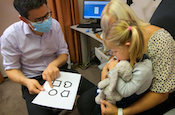
CPD Ref: C-104470
CPD Points: ![]()
CPD Type: ![]()
Domains: Clinical practice, Communication
![]()
![]()
This is the second instalment of a three-part course focused on assessing vision from birth to 18 years. Part two explores how examination approaches can be adapted as children progress through toddlerhood and the pre-school years. It covers the significance of using age-appropriate communication styles and offers guidance on selecting the most suitable tests and techniques for each individual child.
Topics: Communication, Preferential looking, Crowded picture and letter acuity tests, Stereopsis, Binocular vision, Static retinoscopy, Mohindra retinoscopy, Cycloplegic retinoscopy, Dynamic retinoscopy, Prescribing, Young eye series.
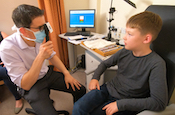
CPD Ref: C-104592
CPD Points: ![]()
CPD Type: Non-interactive
Closing Date: 30 September 2025
Domains: Clinical practice, Professionalism
![]()
![]()
This is the third instalment of a three-part course focused on assessing vision from birth to 18 years. Part three examines how to choose the most appropriate tests, equipment and techniques for vision in school-age children. It also highlights the considerations around safeguarding, confidentiality and consent.
Topics: Communication, Dynamic retinoscopy, Slit-lamp examination, Colour vision testing, Unexpected results, Gillick competence, Confidentiality, Consent, Safeguarding, Young eye series.

CPD Ref: C-112087
CPD Points: ![]()
CPD Type: Non-interactive
Closing Date: 31 December 2025
Domains: Clinical practice, Communication
![]()
![]()
The first of two programmes discussing the development of vision from birth to 18 years, part one looks in detail at age-related visual norms and what changes occur from birth to age three, highlighting what early abnormalities can impair visual ability.
Topics: Anatomical changes to the visual system, Development of VA, Contrast perception, Colour perceptions, Accommodative systems, Binocular systems, Ocular and neurodevelopmental abnormalities arising from forceps delivery or prematurity, Synaptogenesis, Emmetropisation, Infantile esotropia, Retinoblastoma, Physical development milestones, Young eye series.